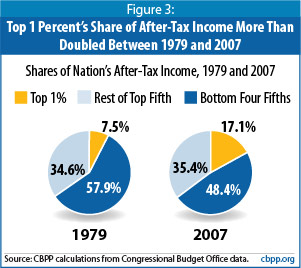Close window | View original article
Why the Rich Get Richer 1
It takes surplus money to make money.
One of the favorite slogans of the Occupy Wall Street crowd is, "We are the 99%!" By this they mean that they aren't in the super-rich 1% which, we are told, are the only ones that have managed to increase their wealth or incomes over the last few decades.
They don't really need a sign to thus identify themselves, as a simple whiff would do just as well. Not for them Joe Biden's compliment of Barack Obama as being "bright, articulate, and clean"!
However, the complaint that "the poor get poorer, the rich get richer" has taken on a very solid political reality; it's now all but received wisdom.

As this graph shows, there's a certain degree of truth to the charge: the top 1% are indeed getting a larger total share of national income, or at least were in 2007. Now, that doesn't mean everyone else has necessarily gotten poorer - national income has increased far more, so every economic class has gotten at least a little richer. Let's be reasonable, however: it's hard to be satisfied with a 16% increase over thirty years when the already-rich managed to almost triple their take.
Why? What causes the rewards of wealth to proceed to those who already have it?
Forget The Poor, What About You?
For purposes of this discussion, we're going to willfully disregard that class of people whom the Left accuses us of not caring about, the very poor.
We could list a hundred obstacles placed in the way of poor people, from awful union-infested inner-city schools, to crime-ridden inner-city neighborhoods where few honest employers dare enter, to moronic local officials who think actual businesses would only tempt poor constituents to rip them off.
Unfortunately, most of those obstacles are politically unfixable due to the corrupt politicians the welfare-dependent poor so often elect. Someday that may change; until then, the reasons the poor are poor are clearly manifest.
What's far more relevant is why the middle classes aren't doing better. Almost by definition, middle-class folks have an adequate education - not Harvard, maybe, but there's nothing shabby about a state university. Middle-class families have equity in their communities by virtue of home ownership, and some level of financial assets as well; their incomes are generally adequate to cover their reasonable needs.
Why can't they do better? Why aren't more small businesses being founded and growing? Not everyone can be the next Google Guys, but there's nothing wrong or implausible about Joe the Plumber's dream to own a small plumbing contracting firm with a dozen employees or so, more than enough to elevate him to the ranks of the single-digit millionaires after a decade or two.
A single-digit millionaire, a small businessman profiting by a quarter-million or so - this isn't far from the vaunted 1%, which according to the New York Times requires an annual income of $386,000. Certainly it's solidly into the top 10% - maybe not "rich" in the TV sense, but more than comfortable unless they're Manhattanites.
Now, it's true that the housing bubble collapse devastated many families' balance sheets, but there's an even more immediate source of fear. The Obama depression has killed any sense of job security - you may have a perfectly fine job today, but there's no guarantee you'll have one tomorrow, and absolutely no reason to suppose you could find another anytime soon. Today's middle class is just one pink slip away from a slow but extremely-hard-to-stop slide into poverty and collapse.
This might sound like a reason why people would start small businesses: after all, you can't be fired from a company you own. The trouble is that virtually all modern businesses, except a handful of high-tech software startups, require a fair amount of capital to get off the ground.
Want to start a store, a restaurant, a hair salon? You'll need hundreds of thousands in cash before you open the door on your first day, and much more to keep paying the bills until the business can turn a profit.
Most budding entrepreneurs aren't willing to sleep on the floor in the back office while their business gets off the ground. Profit or not, they need a salary to pay for their home, their food, their medical care, and so on. So a wise business starter will make sure he has plenty of financing before he lifts a finger to start a new business, at least enough to run for a year and preferably two.
How many of you have $750,000 lying around? How many of you could borrow that much, secured against nothing more than a dream? Almost by definition, if you can come by that sort of cash, you're rich.
That's why, contrary to Harry Reid's idiotic remark that "Millionaire job creators are like unicorns," serious job-creators are almost exclusively millionaires. If the only ones who can afford to seriously play in the entrepreneurship game are the already-successful, no wonder only the rich get richer!
Alas, this simple truth leads us to a very strange logical path to socialism, as we'll see in the next article in this series.